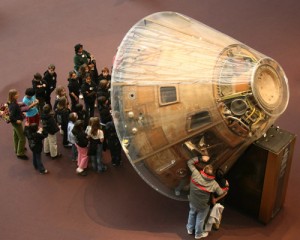Space Program vs. Space Commerce
“Your job is not to envision the future, but to enable it.” – Antoine de St. Exupery

“Your job is not to envision the future, but to enable it.” – Antoine de St. Exupery
Originally, I had not planned to write anything for the blog today; the web is already inundated with retrospective-, perspective-, nostalgia-laden, crying-in-my-beer pieces on today’s 40th anniversary of the Apollo 11 launch. One shudders to think what’s coming in just a few days, on July 20, the actual anniversary of the lunar landing. However, a news piece caught my eye because it casts the lunar landing in stark perspective (for me, at least) and makes me wonder whether some historical amnesia is at work within the space enthusiast community.
Ned Potter of ABC News has cast some cold water on the warm and rosy glow of the good old Apollo days. In brief, he’s looked at some of the old polling data and finds that, lo and behold, the public was split on the value of going to the Moon. In fact, a plurality of people polled back then opposed the lunar voyage, thinking that it cost too much money and delivered too little. This actually jibes pretty well with my recollections. As a young space enthusiast (I was 16 years old during the Apollo 11 mission), I can remember constantly defending spending money on the space program. Mostly, I did this with my high school classmates but sometimes, I even argued with my parents about it!
The simple fact is, the public is now and has always been split on the value of a federal government space program. It received its largest margin of support when viewed in the perspective of national security, but the lunar program was under fire as a waste of tax money from the beginning. Even John F. Kennedy, widely credited today as a “visionary” President, desperately wanted to find some other arena in which we could compete with the Soviets and win. At one point, he favored desalination of seawater as an appropriate scientific and technical challenge for America.
I have previously written on the nature of public support for space. In my opinion, it’s a mile wide and an inch deep. People are at best lukewarm in their support and virtually no one casts a vote on the basis of whether or not a candidate supports the space program. Yet there is amongst the space community a feeling that somehow, getting people enthused about a space goal is essential to accomplishing that goal (putting the cart before the horse).
If the ABC News story is even partly correct, such a belief is unwarranted, both then and now. In retrospect, we remember the successes and the triumphs, but forget about the naysayers. How many remember that on the day of the Apollo 11 launch, there was a “poor people’s march” on Kennedy Space Center, led by Rev. Ralph Abernathy? He told reporters that he had came “not to protest the moon program, but to remind America of its unfulfilled promises.” When the rocket actually launched, he too was swept up with the thrill and emotion of it all and cheered on the mission as loudly as anyone. Imagine! Success drawing in a doubting public! When you accomplish exciting things in space, you capture the imagination—people begin to believe that they too can own a piece of this great adventure.
Others look on the issue of public support for space as improving or static. Andy Chaikin asks whether anyone “still cares” about the Moon. But the real issues are who supports a lunar return and for what reasons. As a people, Americans tend not to support endless public spectacles. Today, people who still follow NASA are asking, “Where’s the beef?” They’re looking for more than a postcard from space or a PR extravaganza. They want some legacy from their investment and they are right for doing so.
Just saying that you’re doing something exciting isn’t the same as doing something exciting. And hearing about how exciting something is sure as hell isn’t the same as doing it. To launch an enduring legacy built on the accomplishment of Apollo 11 and begin the return on our investment, NASA needs to enable the private sector's ability to capitalize on space resources, starting by demonstrating this capability on the Moon. Then the public can join in the construction of a road to space as opposed to being mere spectators in a museum to the past.
Start the countdown to true space exploration freedom—the one that brings all of humanity into the business and the adventure of advancing to the stars. Put the horse in front of the cart and enable the future. Humanity’s imagination and resourcefulness will expand in the process and the benefits will be many.
/https://tf-cmsv2-smithsonianmag-media.s3.amazonaws.com/accounts/headshot/blog_headshot_spudis-300x300.jpg)
/https://tf-cmsv2-smithsonianmag-media.s3.amazonaws.com/accounts/headshot/blog_headshot_spudis-300x300.jpg)